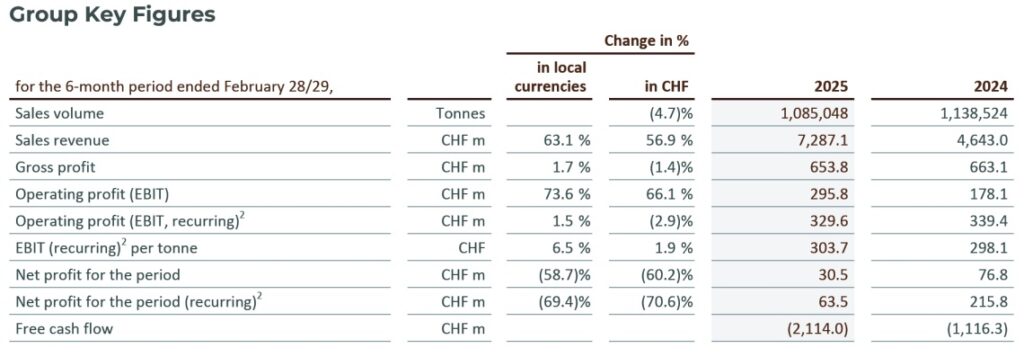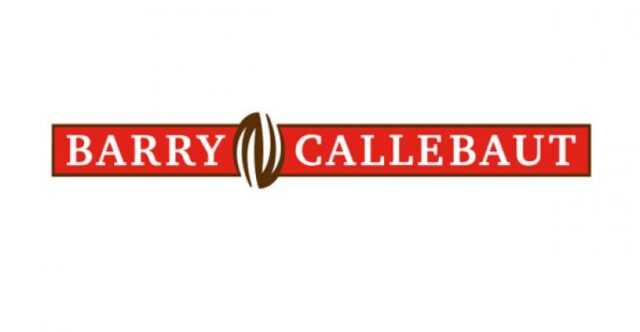ZURICH, Switzerland – The Barry Callebaut Group reported sales volume of 1,085,048 tonnes in the first six months of fiscal year 2024/25 (ended February 28, 2025). The highly volatile market environment impacted customer behavior and pricing, resulting in a sales volume decrease of -4.7%.
Sales volume for Global Chocolate decreased by -4.5% in a declining global chocolate confectionery market according to Nielsen3 (-2.4%). Food Manufacturers (-5.6%) were significantly impacted by market dynamics with large pricing actions, historically low levels of customer orders and other short-term changes to customer behavior given the volatility. Gourmet (+0.7%) delivered positive growth, recovering in the second quarter with resilient demand across most regions.
Looking at regional performance within Global Chocolate, Latin America (+7.5%) was the strongest contributor to volume performance, with solid demand across clusters supported by innovative customer solutions. Asia Pacific, Middle East and Africa (AMEA, +1.8%) saw double-digit growth in India, Indonesia and the Middle East, which was partially offset by macro-economic factors further impacting performance in China. North America reported a volume decrease of -2.3%, impacted by decisive action to temporarily close the Toluca facility in Mexico and weaker demand for large Food Manufacturers, which more than offset new customer wins. Central and Eastern Europe (-6.6%) saw lower volumes for several large regional and local Food Manufacturer customers, especially in Türkiye. Volume development in Western Europe (-7.6%) was significantly impacted by high pricing and changed customer behavior in the challenging market environment, such as selective insourcing, as well as SKU rationalization. The region was also partly impacted by the high base of comparison, with a large one-off contract in the prior-year period.
Sales volume for Global Cocoa declined -5.6% as the business prioritized volume in the supply constrained environment and saw a negative demand impact from significant cocoa bean price increases, particularly in AMEA and CEE.
Sales revenue amounted to CHF 7,287.1 million, up +63.1% in local currencies (+56.9% in CHF). The increase was driven by Barry Callebaut’s cost-plus pricing model as the business passed through significantly higher cocoa bean prices to customers.
Gross profit amounted to CHF 653.8 million, up +1.7% in local currencies (-1.4% in CHF), supported by the company’s cost-plus pricing model as well as mix.
Operating profit (EBIT) recurring2 amounted to CHF 329.6 million, an increase of +1.5% in local currencies (-2.9% in CHF) compared to the prior year. The increase came despite the impact of negative volume growth due to lower and delayed customer demand in light of record bean prices, as the cost-plus model successfully passed on a significant portion of cost increases.
Recurring4 EBIT per tonne amounted to CHF 304, up +6.5% in local currencies (+1.9% in CHF). Recurring4 EBIT for Global Chocolate was CHF 340.1 million, up +2.0% in local currencies (-2.3% in CHF). Recurring4 EBIT for Global Cocoa was CHF 49.4 million, up +11.1% in local currencies (+7.6% in CHF), supported by volume prioritization in the supply constrained environment.
EBIT reported was CHF 295.8 million, compared to CHF 178.1 million in the prior year (+73.6% in local currencies and +66.1% in CHF). Net one-off BC Next Level operating expenses amounted to CHF 26.8 million.
Net profit for the period recurring4 amounted to CHF 63.5 million, down -69.4% in local currencies (-70.6% in CHF). Performance was impacted by significantly higher financing costs and steep backwardation in the market, with the cost-plus model not able to fully pass on the major increases to customers given the unprecedented speed of market volatility, low customer orders and the longer pricing cycle in Gourmet. Net finance costs increased significantly to CHF -196.7 million, up from CHF -72.1 million in the prior year, mostly as a result of the higher debt level in the context of the cocoa bean price acceleration as well as increased interest rates. Net profit reported was CHF 30.5 million, including net one-off BC Next Level operating expenses.
Net working capital increased to CHF 5,900.8 million from CHF 2,775.7 million in the prior-year period. The increase was due to the substantial negative impact from twice as high cocoa bean prices, given the long cycle between bean contracting and customer sales, as well as a significant increase in initial and variation margins required by futures exchanges given the volatile environment.
Free cash flow generation amounted to CHF -2,114.0 million, compared to CHF -1,116.3 million in prior-year period, due to the substantial cocoa bean price related working capital increase.
Adjusted Net debt5 increased to CHF 2,919.1 million, compared to CHF 245.7 million in the prior-year period, taking into consideration the cocoa bean inventories as readily marketable inventories (RMI). The increase is predominantly due to the around CHF 2 billion increase in inventory value, including RMI as well semi-finished and finished products, following almost twice as high cocoa bean prices. As a result adjusted5 net debt / EBITDA recurring4 was 3.1x.
 The Barry Callebaut Group: Guidance
The Barry Callebaut Group: Guidance
In the context of a challenging and volatile operating environment, the The Barry Callebaut Group has adjusted its volume outlook for fiscal year 2024/25. Barry Callebaut now expects a mid single-digit decrease in sales volume and reiterates a double-digit increase in EBIT recurring6 growth in constant currency. The company reiterates its previous communication that during the BC Next Level transition period, the dividend per share will not be lower than in fiscal year 2023/24.
Price developments of key raw materials
During the first six months of fiscal year 2024/25, terminal market7 prices for cocoa beans increased significantly, driven largely by speculative buying activity. Prices accelerated from a starting price of GBP 5,332 to a high of GBP 9,425, before closing the period at GBP 7,342 per tonne on February 28, 2025. On average, cocoa bean prices increased by +95% versus the prior-year period. The first months of the 2024/25 harvest saw good arrivals of beans in West Africa and non-West Africa origins, with adverse weather conditions in the later part of the period impacting the mid-crop.
Global sugar prices averaged -20% lower than the same period last year, driven by improving fundamentals. In Brazil, the world’s top producer and exporter, the 2025/26 crop is expected to recover. In Europe, sugar prices fell by an average of -39%, reflecting increased sugar beet acreage for the 2024/25 campaign, higher domestic supply and slightly weaker consumption.
Dairy prices increased on average by +1% compared to the prior year. Despite forecasts of modest global milk production growth in 2025, European supply remains constrained due to last year’s poor weather, which reduced winter feed quality, and the lingering effects of Blue Tongue Virus, which has lowered milk yields in affected cattle. Additionally, export demand has remained resilient, limiting the potential expansion of global dairy stockpiles.
1 In Local Currencies. Please refer to appendix (on page 9 of the PDF) for the detailed recurring results reconciliation.
2 Please refer to appendix on page 9 for the detailed recurring results reconciliation.
3 Source: Nielsen volume growth excluding e-commerce – 26 countries, August 2024 – January 2025. Data subject to adjustment to match Barry Callebaut’s reporting period. Nielsen data only partially reflects the out-of-home and impulse consumption.
4 Please refer to appendix (on page 9 of the PDF) for the detailed recurring results reconciliation.
5 Net debt adjusted for cocoa bean inventories regarded by the Group as readily marketable inventories (February 2025: CHF 3,192.5 million; February 2024: CHF 2,391.7 million).
6 Please refer to appendix (on page 9 of the PDF) for the detailed recurring results reconciliation.
7 Source: London terminal market prices for 2nd position, September 2024 to February 2025. Terminal market prices exclude Living Income Differential (LID) and country differentials.


















